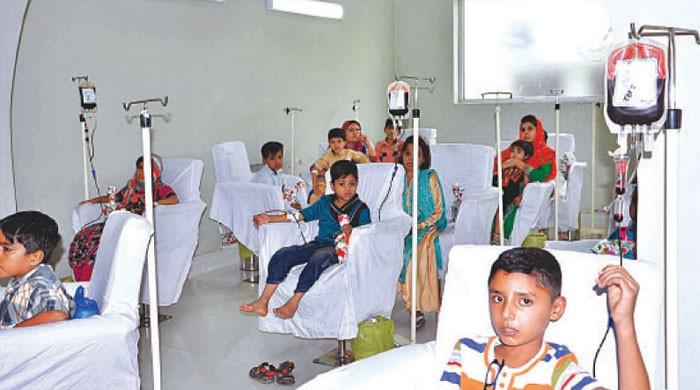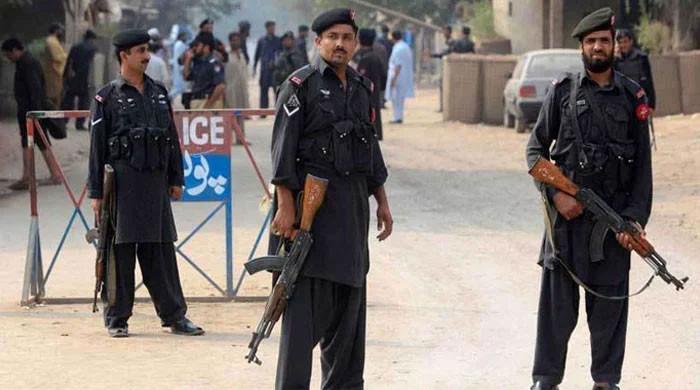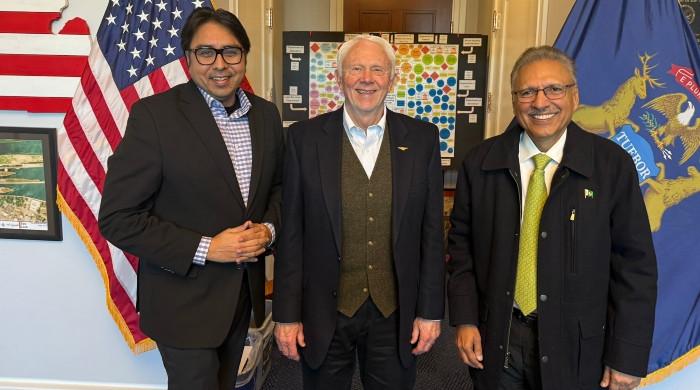Pakistan to strategise response today after Indian actions over Pahalgam attack
Deputy PM Ishaq Dar laments India's response, measures for being "inappropriate, lacking seriousness"
April 24, 2025

- Khawaja Asif says "false flag operation" cannot be ruled out.
- Defence czar calls on New Delhi to investigate Pahalgam attack.
- "No ambiguity that we strongly condemn terrorism," says minister.
ISLAMABAD: Prime Minister Shehbaz Sharif is set to chair a National Security Committee (NSC) meeting today to mull the situation that developed in the aftermath of the New Delhi's measures following the Pahalgam attack in Indian Illegally Occupied Jammu and Kashmir (IIOJK).
"The National Security Committee will issue a comprehensive reply [to India]," Deputy PM and Foreign Minister Ishaq Dar said while speaking on Geo News' programme "Aaj Shahzeb Khanzada Kay Sath".
The sources say that the meeting will be held around 11am with top civilian and military leadership expected to discuss the internal and external security situation and review India's hastily announced actions and measures.
Lamenting the measures taken by India for "inappropriate and lacking seriousness," Dar said New Delhi has not provided any evidence linking Pakistan to the recent terror incident. He added that expressing anger over terror incidents in such a manner is "unjustified", accusing India of shifting blame for its internal issues onto Pakistan.
His remarks come against the backdrop of Indian Prime Minister Narendra Modi-led government's decision to suspend the Indus Water Treaty and ban the entry of Pakistani nationals after 26 tourists were gunned down in IIOJK's Pahalgam.
The announcement, made by the Ministry of External Affairs (MEA), laid out five measures which New Delhi has termed as "decisive response to cross-border terrorism".
The Indus Water Treaty is a water-sharing agreement between Pakistan and India, facilitated by the World Bank. It gives India control over the three eastern rivers (Ravi, Beas and Sutlej) of the Indus basin while it gives Pakistan authority over the three western rivers (Indus, Jhelum and Chenab).
The other measures include the immediate closure of the Integrated Check Post Attari as well as the issuance of a deadline for Pakistanis to leave the country before May 1, 2025.
Also, Pakistani nationals will not be permitted to travel to India under the SAARC Visa Exemption Scheme (SVES) and any SVES visas issued in the past to Pakistani nationals are now deemed cancelled,
Any Pakistani national currently in India under an SVES visa has 48 hours to leave India.
Declaring military, naval and air advisers in the Pakistani High Commission in New Delhi persona non grata, India has asked them to leave the country within a week while also announcing to withdraw its own defence advisors from the Indian High Commission in Islamabad.
New Delhi will also be reducing its overall strength of the High Commissions to 30 from the present 55 by May 1.
Expanding on the situation, Defence Minister Khawaja Asif said the issues raised by India would be discussed in the NSC meeting today.
Speaking on the programme "Aaj Shahzeb Khanzada Kay Sath", Asif noted that India coulnd not unilaterally suspend the Indus Waters Treaty, as the agreement involves not just the two countries, but other stakeholders as well, including the World Bank.
He further added that India has long sought to exit the treaty, but Pakistan remains prepared to respond with full force if necessary.
Separately, speaking to the media, the defence minister said that Pakistan has absolutely nothing to do with it, as Pakistan rejects terrorism in all its forms and everywhere.
"This is all home-grown, there are revolutions in different so-called states against India, not one, not two, but dozens, from Nagaland to Kashmir, in the Khwahsciouth, in Chattisgarh, in Manipur. In all these places, there are revolutions against the Indian government," he remarked.
Asif said that India should investigate the Pahalgam incident as merely levelling allegations won’t absolve them of responsibility.
"India's allegation against Pakistan for the Pahalgam incident is inappropriate," he said, adding that Pakistan is the most affected country by terrorism and has been facing the menace for decades.
"There should be no ambiguity that we strongly condemn terrorism," the defence czar said; however, he added that a "false flag operation" could not be ruled out.
The defence czar's concerns regarding a false flag operation have also been echoed by various defence analysts.
Brigadier (retd) Rashid Wali, while talking to Geo News, raised questions about India's approach, noting that propaganda against Pakistan started doing the rounds almost immediately after the attack, with Indian media spreading baseless claims.
Former senator, Mushahid Hussain Syed, who is also a veteran foreign affairs expert, condemned India's practice of jumping to blaming Pakistan following terror incidents in India or IIOJK.
The scepticism is to be taken in the context of India's newsrooms resorting to war-mongering coupled with social media trends advocating for retaliation against Pakistan.











